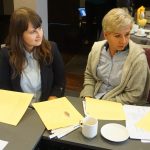To strengthen smart specialisation by fostering interregional cooperation is one of the main goals of the Interreg Baltic Sea Region (BSR) project “GoSmart BSR”. In order to discuss how S3 strategies could be put on a macro-regional level, the Hamburg Institute of International Economics (HWWI) organized a Policy Dialogue in Brussels in cooperation with the City of Hamburg. More than 30 stakeholders from politics, industry and science gathered on Feb 20th, 2019 at the Hanse-Office. A key focus of the debate was addressing the question how interregional collaboration in S3 can open up new business opportunities for small and medium enterprises (SMEs).
The opening keynotes addressed problems in SME internationalisation and potentials for transnational cooperation in S3. In his speech, Janos Schmied from the European Commission (DG Internal Market, Industry, Entrepreneurship and SMEs, Enterprise Europe Network and Internationalisation of SMEs Unit) spoke about the necessity of assisting small and medium enterprises in the EU. He pointed out that the SMEs benefit from financial, advisory, innovation support but also from facilitated collaboration thanks to international partnerships. Beside of programs like the COSME and the Enterprise Europe Network, the European Commission helps and encourages SMEs to go abroad by providing coaching and specific knowledge through the Ready2Go or the IPR Helpdesk initiatives.
The second key note speaker, Esa Kokkonen, Director The Baltic Institute of Finland. Coordinator of Priority Area Innovation of the EUBSR, showed the importance of policy area innovation. He suggested that by enabling shared learning, expanding network activities and aligning resources, the Baltic Sea Region could count on stronger collaboration for the future; such as joint funding and decision-making or increased stakeholder and institutional capacity. Therefore, this strategy will consolidate or even strengthen the competitive position of the Baltic Sea Region for research and innovation.
During the following panel discussion Thomas Jensen (South Denmark European Office), Jerker Johnson (Regional Council of Ostrobothnia), Tanja Woronowicz (Innovation Capability Center – TZI University Bremen) and Isabel Sünner (HWWI) gave some insights into their current S3 projects.
Isabel Sünner introduced the methodological tool developed by the GoSmart project. The tool allows to analyse regional S3s in a comparative perspective and to identify common priorities for interregional collaboration based on solid statistical analyses. After a successful pilot phase, it is basically ready to be applied in any group of regions. The BSR could be a good test bed for further validating the tool. Subsequently, the panellists exchanged experience on how entrepreneurial discovery processes can be best organized in the regions as well as on a macro-regional level. The aim is to establish a frequent bottom-up stakeholder dialogue on S3 implementation.
Thomas Jensen acquiesced in the importance of the transregional dimension of these strategies and highlighted the fact that S3 should especially be developed in medium sized cities and regions within the BSR. By transmitting expertise and reinforcing collaboration between the different actors, the mentioned regions could tap their full potential.
Following this idea, Jerker Johnson elaborated the case of smart specialization for the Ostrobothnian economy. He also emphasized the importance of the learning process among the different actors in the region. For example, Triple-Helix dialogue between universities, public authorities and companies can reduce strategy gaps by finding adequate solutions.
As well as her preceding speakers, Tanja Woronowicz from the Innovation Capability Center of the University of Bremen showed the advantages of interregional and inter-sectoral collaboration. She indicated that the cooperation should go beyond regional boundaries and showed how the Public Policy Living Lab aims at optimizing teamwork within the Triple-Helix construct.
A second “political” panel concluded by addressing needs for further actions. Panellists were Wioletta Dąbrowska (Director of Regional Development Department, Podlaskie Marshal Office), Thomas Jacob (Senate Chancellery, Free and Hanseatic City of Hamburg), Krista Taipale (Region of Kymenlaakso, Finland and Head of Brussels Office), Esa Kokkonen (Director of the Baltic Institute of Finland and Coordinator of PA Innovation of the EUBSR), Marta Marin (ERRIN and Smart Specialisation Working Group Leader), Wieslaw Urban (Bialystok University of Technology and Lead Partner of the “GoSmart BSR” project). They exchanged thoughts regarding the EU’s post 2020 multiannual financial framework and what they see as key challenges to manage S3 strategies at the macro-regional level. It was controversially discussed whether there is a need for more financial instruments, or first and foremost for better integration of S3 into the daily work of the regional innovation actors.
The lively debate among all participants once again made clear that transnational cooperation among industry, the research & development sector and authorities is a key driver in smart specialisation strategies. In the run-up to the post-2020 period the regional policy owners should take up the chance to integrate transnational aspects in their S3 and agree upon concrete areas of cooperation. The acceptance for that can be increased by applying scientifically validated analysis tools like the GoSmart methodology. This can especially be of benefit for regional SMEs by opening up new business opportunities in high potential sectors.
Article prepared by Isabel Sünner, Head of International Cooperation, Hamburg Institute of International Economics (HWWI), and Susanne Müller-Using, Senior Project Manager, Hamburg Institute of International Economics (HWWI).





